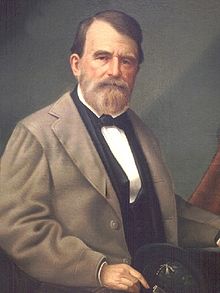John McEnery (Louisiana)
| John McEnery | |
|---|---|

John McEnery's portrait, 1880s
|
|
| 25th Governor of Louisiana | |
|
In office January 13, 1873 – May 22, 1873 |
|
| Lieutenant | Davidson B. Penn |
| Preceded by | P. B. S. Pinchback |
| Succeeded by | William P. Kellogg |
| Personal details | |
| Born |
March 31, 1833 Petersburg, Virginia, U.S. |
| Died | March 28, 1891 (aged 57) New Orleans, Louisiana, U.S. |
| Political party |
Republican (1860s–1870) Liberal Republican (1870–1872) Democratic (1872–1891) |
| Religion | Catholic Church |
| Military service | |
| Allegiance |
|
| Service/branch |
|
| Years of service | 1861–1864 |
| Rank |
|
| Commands | 4th Louisiana Infantry Battalion |
| Battles/wars | American Civil War |
John McEnery (March 31, 1833, Petersburg, Virginia – March 28, 1891) was a Louisiana Democratic politician and lawyer who was considered by Democrats to be the winner of the highly contested 1872 election for Governor of Louisiana. After extended controversy over election results, the Republican candidate William Pitt Kellogg was certified. McEnery, who had been an officer in the Confederate States Army during the American Civil War, was not allowed to take office following a weighing in by the federal government and local Republicans loyal to President Ulysses S. Grant.
In the election of 1872, McEnery, a Democrat, was supported by a coalition of Democrats and anti-Grant Republicans, including Republican Gov. Henry C. Warmoth. Warmoth's opponents in the Republican Party remained loyal to President Grant, and supported Republican nominee William Pitt Kellogg.
Governor Warmoth had appointed the State Returning Board, which administered elections. A rival board endorsed Kellogg, although Kellogg's board had no returns or ballots to count; Warmoth was impeached and removed for "stealing" the election. The Lieutenant Governor, black Republican P. B. S. Pinchback, became Governor for the last 35 days of Warmoth's term. Both McEnery and Kellogg had inaugural parties and certified lists of local officeholders.
In the spring of 1873, McEnery and his friends formed a rump legislature in New Orleans. Five thousand of his armed white militia entered New Orleans and fought off the police and state militia. They occupied the state house and armory and turned the Republican Kellogg out of office. This was called the "Battle of Liberty Place". It was not until Federal troops were on their way that the forces retreated from New Orleans.
The extended controversy contributed to violence throughout the state. The Colfax Massacre on Easter Sunday 1873 was related to the contested election. White Democratic militia, raised from surrounding parishes, attacked Republican blacks who had gathered at the Colfax courthouse to defend Republican officeholders. The attackers killed more than 80 black men; three whites were killed. The events were preceded by rumors on both sides, as tensions rose in the parish.
...
Wikipedia
